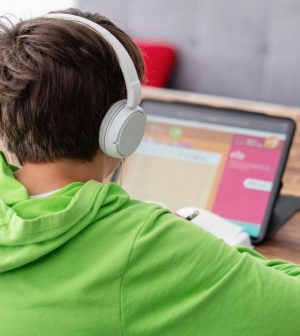- Recognizing the Signs of Hypothyroidism
- 10 Strategies to Overcome Insomnia
- Could Artificial Sweeteners Be Aging the Brain Faster?
- Techniques for Soothing Your Nervous System
- Does the Water in Your House Smell Funny? Here’s Why
- Can a Daily Dose of Apple Cider Vinegar Actually Aid Weight Loss?
- 6 Health Beverages That Can Actually Spike Your Blood Sugar
- Treatment Options for Social Anxiety Disorder
- Understanding the Connection Between Anxiety and Depression
- How Daily Prunes Can Influence Cholesterol and Inflammation
Remote Learning Hurt High School Students Academically, Emotionally

There were academic, social and emotional consequences for U.S. high school students who attended classes remotely during the COVID-19 pandemic, new research shows.
The study included more than 6,500 students in Orange County Public Schools in Florida, who were surveyed in October 2020, when two-thirds were attending school remotely and one-third were attending in person.
On a 100-point scale, in-person students scored higher than remote students on social well-being (77.2 versus 74.8), emotional well-being (57.4 versus 55.7) and academic well-being (78.4 versus 77.3).
This “thriving gap” was consistent across gender, race/ethnicity and socioeconomic status, according to the study published online July 13 in the journal Educational Researcher.
“Notably, the thriving gap was larger among students in 10th through 12th grades than it was among ninth graders,” study co-author Laurence Steinberg, a professor at Temple University in Philadelphia, said in a journal news release.
While the differences between the two groups of students aren’t large, even small effects are significant when they impact millions of people, the researchers explained.
“Many news stories have reported on individual stories of teenagers who have suffered from anxiety, depression and other mental health challenges during the pandemic,” said study author Angela Duckworth, a professor at the University of Pennsylvania and the founder and CEO of Character Lab.
“This study gives some of the first empirical evidence of how learning remotely has affected adolescent well-being,” Duckworth added.
Social well-being was assessed by asking the students about fitting in at school, whether there was an adult in their school who could offer support or advice, and whether there was an adult in their school who always wanted them to do their best.
For emotional well-being, the teens were asked how often they felt happy, relaxed and sad, and how they felt overall about their life.
For academic well-being, the students were asked how interesting they found their classes, how important they felt it was for them to do well in their classes, and how confident they were that they could succeed in their classes if they tried.
“As policymakers gear up for national tutoring and remediation programs — which we agree are urgent priorities — we must recognize that our nation’s students are not just lagging as performers, they are suffering as people,” Duckworth said.
“Meeting their intrinsic psychological needs — for social connection, for positive emotion, and authentic intellectual engagement — is a challenge that cannot wait,” she added.
More information
There’s more on education during the pandemic at the Education Commission of the States.
SOURCE: Educational Researcher, news release, July 14, 2021
Source: HealthDay
Copyright © 2026 HealthDay. All rights reserved.










